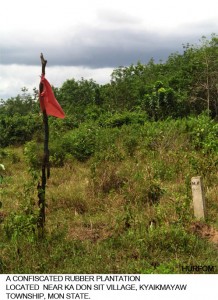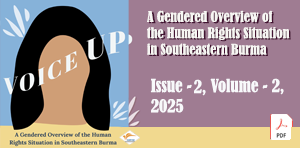Farmers describe discrimination and corruption in land compensation schemes
August 19, 2013
HURFOM: Last week HURFOM reported on exploitative land grabs committed by domestic companies seeking to establish cement production in the region around Kyiakmayaw Township in Mon State. Since then, new accounts have surfaced alleging additional discrimination by Pacific Link Cement Industries Ltd. and June Industry Co. Ltd. against farmers deemed by the companies to have lower levels of education, insufficient awareness of their legal rights, or lacking the benefit of personal ties to local authorities.
 Officially, compensation for land acquired from residents of Kaw Doon, Kaw Pa Naw, Ka Don Sit villages was divided into four price brackets according to the quality of the parcel purchased by the companies. Owners of “Level 1” land, classified as the highest quality, were to receive 350,000 kyat per acre whilst Levels 2, 3 and 4 were allotted 300,000, 50,000 and 15,000 kyat per acre respectively.
Officially, compensation for land acquired from residents of Kaw Doon, Kaw Pa Naw, Ka Don Sit villages was divided into four price brackets according to the quality of the parcel purchased by the companies. Owners of “Level 1” land, classified as the highest quality, were to receive 350,000 kyat per acre whilst Levels 2, 3 and 4 were allotted 300,000, 50,000 and 15,000 kyat per acre respectively.
According to a HURFOM field reporter, five farmers from Ka Don Sit village, each owning between 3 and 10 acres of land, received differing amounts of compensation per acre despite holding what they perceived to be land of similar quality.
Residents also claimed that higher sums were awarded to farmers thought by the companies to understand their legal rights and who would be willing and unafraid to register complaints. Nai San Shein, 60, from Ka Don Sit village detailed how the companies gathered background information on local farmers before making offers of compensation.
“Before land confiscation took place two years ago, the group [from Pacific Link Cement Industries Ltd. and June Industry Co. Ltd.] came to ask for [land grant] paperwork and household lists [detailing members of the household and their level of education] from the residents. After taking [the paperwork] they only gave it back to some villagers and others did not get anything back. So [the companies] knew a lot about us and our weak points. They intimidated us by misusing the law.”
In addition, company representatives are accused of exploiting villagers who only speak their ethnic Mon language and were unable to negotiate directly with company officials speaking in Burmese. Other accounts alleged that corrupt administrators doled out more compensation to personal acquaintances.
According to local people, these complicated and inequitable land compensation methods have caused disunity in the village and rifts between family members who have conflicting opinions about whether to sell the land or deal with the companies. In response, Kyaikmayaw residents have called for assistance in navigating the complex and often corrupt legal and administrative land dispute process.
“My land was not bad at all, [it produced] 30 to 40 baskets of rice per one acre. I just got thousands of kyat compensation [as opposed to hundreds of thousands], but others got higher than me because they were close with the village administrator,” said a farmer from Ka Don Sit village. “We are oppressed due to having a lack of knowledge. When [members of] the land records department visited here, we hosted them [and gave them] a meal but now they stand up only for the companies. So we would like someone who has education and knowledge to guide and help us. We would like to request a group to come that can help solve [our problems] and seek justice for us.”
Comments
Got something to say?
You must be logged in to post a comment.



















































